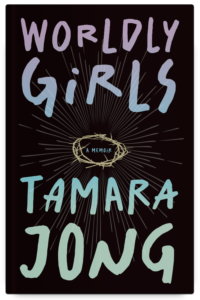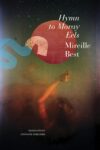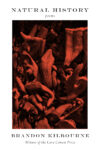
[Book*hug; 2025]
Worldly is defined in the epigraph of Tamara Jong’s new memoir-in-essays Worldly Girls as “an individual who does not follow Jehovah and his laws, who pursues materialism, higher education, and fleshly desires…” In this context, worldly is meant to be pejorative, affiliating the people it describes with the moral tier of their fixations. Worldly designates a category of people juxtaposed against those who belong to the Kingdom of Heaven and are therefore “not of this world,” in the same way that Jesus was not of this world (John 17:16). It’s an ancient religious binary that demarcates who is in and who is out.
Jehovah’s Witnesses are forbidden from a wide range of secular activities, including fellowship with nonbelievers: “bad association.” I recognize this suspicion of outsiders and their potentially corrupting influence from my evangelical upbringing. Several things Jong writes about her time as a Jehovah’s Witness remind me of my time as an evangelical—the way it provided both structure and restriction—but I feel hesitant to over-identify, because there’s so much about the Jehovah’s Witnesses I don’t know.
Jong’s family entered the fold when she was two years old, around the arrival of her baby brother, Tommy. “Like Ma,” Jong writes, “I became a Jehovah’s Witness, indoctrinated from my toddler days. Going to meeting three times a week, going door to door, going to ministry school and studying the Bible made me a faithful devotee. These leanings should have brought Ma and me closer but didn’t.” Jong’s two major themes, her mother and religion, are indelibly related.
Jehovah’s Witnesses are not a singular, uniform identity, and Jong meticulously accounts for her specific experience as a mixed-race woman in a working-class family in Montreal at the end of the twentieth century, as the middle child of angry parents, as the anxiously attached daughter of an alcoholic mother who copes with her own traumatic and abusive upbringing. Jong writes as a woman whose life has been striped with grief. She has suffered, like her mother did before her, from severe depression; she has been hospitalized for her mental health; she has experienced extensive estrangement and has found both comfort and censure in her religion.
The pieces that make up this book are mostly short, three- to five-page braided essays that could stand on their own. Many of them were originally published in literary magazines and anthologies from across North America, including The Humber Literary Review, The Fiddlehead, and Body & Soul: Stories for Skeptics and Seekers, from Caitlin Press. Multiple essays appear as letters, one written to a schoolmate of Jong’s, another to the celebrated memoirist Mary Karr. Jong’s voice maintains a naivete, presenting as younger than her fifty years. Her writing is straightforward and unadorned.
Now, away from the flock, the pang of God guilt hovers around the back of my brain, and I wonder if I’ve made a mistake leaving the Jehovah’s Witnesses. It was a safe place for a mixed-race person like me. I wasn’t an outsider. All the pictures in the Jehovah’s Witness literature–besides the destruction at Armageddon–had everyone from different cultures in harmony. Racism couldn’t possibly exist in God’s organization. No one treated my Chinese dad as different. He would’ve told us, wouldn’t he?
Her unanswered questions allow the reader to watch Jong reach her own realizations, as if she’s growing up in real time on the page.
Because the essays were written to function independently, the collection unfolds somewhat haphazardly, cherry-picking its way through Jong’s history. Many elements of Jong’s biography are revisited, often in greater depth or with more probing questions with each additional appearance. In the first essay, Jong reveals that her mother was disfellowshipped for smoking and that she drowned in Mexico when Jong was twenty. Anachronistic revelation is a hallmark of postmodern storytelling, but stories typically emerge from a chain of consequence: the implication that a story’s developments are somehow contingent upon or triggered by previous circumstances. Jong brings together many significant events in her life, but does not present them in such a way that establishes a chain of consequence. “I don’t have a tidy ending, but I didn’t really expect one, did I?” Jong asks. “I guess I’ll just figure it out as I go.” When she does venture to assert causation, she does so tentatively: “I wonder now,” Jong writes, “if Ma’s sudden death all those years ago was a catalyst that would eventually lead to my leaving [the Jehovah’s Witnesses]. All I know is faith made me see, and then one day it didn’t.” This narrative unmooring, while unconventional, strikes me as a byproduct of Jong’s departure from high-control religion. Religious storytelling, in its assertion of cosmic consequence, teems with projections of divine causation. Divine punishment, retribution, comeuppance, karma: Aren’t these all, in some way, attempts to ascribe causation? Such rationalizations are so tired they veer into the cliche: “There’s no such thing as coincidence.”
Jong resists the “inspirational” impulse of media designed to cultivate devotion. She speculates briefly that her infertility might be divine punishment, but she can’t sustain the idea. Instead, she counters, “I wonder if I wasted my life because I thought I was serving Him and was doing His will, which seems rather pretentious now that I think about it.” Rather than claiming a new framework for enlightenment, Jong embraces the ambiguity that comes after walking away from what one understood as ultimate truth. Her book is rife with the kind of questions that proliferate after one leaves an authoritarian religious structure. “What do I miss about being a Witness, believing and praying to God?” Jong asks. “Being forgiven? Does God ignore those who leave Him? Does He miss me? I don’t have the answers. At least, not the answers I’m ready to face.”
The past few years have seen a proliferation of memoirs and essay collections about leaving religion, including Deborah Feldman’s Unorthodox, Tara Westover’s Educated, and Safiya Sinclair’s How to Say Babylon. Jong does not portray her time in the Jehovah’s Witnesses as traumatic; rather, she balances the circumstances in her life shaped by religion with the circumstances shaped by other factors, such as intergenerational trauma. Jong responds to her years as a believer with curiosity, openness, and nuance. For some readers, Jong’s temerity will be what gives the book its sparkle. She writes not as an authority, but as a student of her own life. The prose reminded me of Cait West’s highly accessible accounting of the Christian stay-at-home-daughter movement, Rift, while Jong’s intentional spiritual openness called to mind Jordan Kisner’s wide-ranging collection of essays, Thin Places.
Jong’s tenderness and vulnerability come into full view when she explores her relationships with other women. These are, presumably, the titular “worldly girls”: Jong herself, who walks away from the Jehovah’s Witnesses, and her mother, who first brought Jong into the Witnesses and was then disfellowshipped during Jong’s most fervent years of devotion. When Jong begins to drift away from her faith, spurred by therapy that “had [her] thinking about possibilities other than religion and God,” her best friend Robin treats Jong with the same kind of emotional withholding that Jong displayed to her mother so many years before. “I’ve done what Robin is doing to me now,” Jong recognizes. Transparent, aching grief for the loss of her best friend stains the pages of the essay “Lessons,” one of my favorites in the collection. “Lessons” sets the tone for the book’s exploration of female intimacy, so often pitted against spiritual progress, and how many times Jong herself has been asked to choose between righteousness and emotional connection with other women. While Jong was still a Jehovah’s Witness, Robin served as a stand-in maternal figure, similar to how Jong’s mother found her own substitute-mother in a woman named Virginia. Jong’s reverent inventory of female interdependence made me think of Lily Dancyger’s First Love, a celebration of women’s friendships.
Some of the most touching relationships in the book emerge from Jong’s connection with her stepdaughter and her stepdaughter’s mother. Jong gets married somewhat late in life, and while she’s always wanted children of her own, she must first confront the legacy of generational trauma from her mother and her fears about being the kind of parent she had. “I thought that having a baby would reveal everything I hated about myself,” Jong admits. Biological reproduction turns out not to be an option for Jong and her husband, Ed, which plunges Jong into a period of depression and questioning. However, Jong and Ed share custody of Ed’s young daughter, Avery, with Ed’s ex, Lori, until Lori herself dies young in a car accident. In the last conversation between Jong and Lori, Jong recalls, “Lori told me that I was [Avery’s] mom too.” At that time, neither Jong or Lori could know how Avery’s imminent loss of her mother might mirror Jong’s, how sometimes, one’s suffering can transform into another’s balm. Jong doesn’t name the painful symmetry between herself and Avery, but she illustrates their intimacy in gentle scenes.
Jong’s mothering of Avery becomes the most tender and redemptive relationship in the collection. Theirs is an unbounded relationship, one that the reader senses grows even more robust beyond the edge of the page. In the final essay, Jong and Avery bake a lemon meringue pie together, an act that allows both of these motherless, worldly girls to share a “memory of what a mother can be.”
McKenzie Watson-Fore serves as the executive editor for sneaker wave magazine and the inaugural critic-in-residence for MAYDAY. She holds an MFA in Writing from Pacific University, and her work has been published or is forthcoming in the Offing, Bridge Eight, Christian Century, and elsewhere. She can be found at MWatsonFore.com or drinking tea on her back porch.
This post may contain affiliate links.






